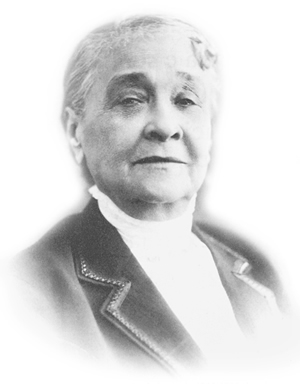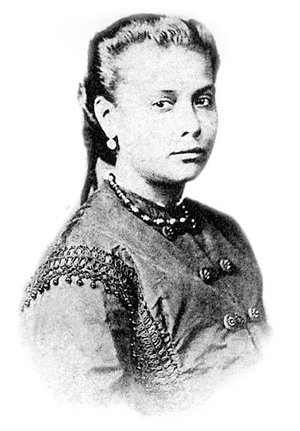Chiquinha Gonzaga facts for kids
Francisca Edwiges Neves Gonzaga, known as Chiquinha Gonzaga, was a famous Brazilian composer, pianist, and the first woman conductor in Brazil. She was born on October 17, 1847, and passed away on February 28, 1935.
Chiquinha Gonzaga was a pioneer. She was the first pianist to play "choro" music. She also wrote the very first carnival march, called "Ó Abre Alas," in 1899. Her stage shows, like Forrobodó and Jurití, were very popular. They used fun elements from Brazilian culture of her time.
Contents
Chiquinha Gonzaga's Life Story
Growing Up in Rio
Chiquinha Gonzaga was born in Rio de Janeiro. Her mother was of mixed race and poor, while her father was a wealthy white man. After Chiquinha was born, her father became a high-ranking military officer called a marshal. Her godfather was a very important person, Luís Alves de Lima e Silva, Duke of Caxias.
It was a difficult time for Chiquinha's mother because society looked down on her relationship with Chiquinha's father. Despite this, her father accepted Chiquinha as his daughter and married her mother.
Like many girls from military families in the 19th century, Chiquinha had a good education. Her father was strict and wanted her to have a good future. He hoped she would marry well and become a respected "lady." She learned to read, write, do math, and most importantly, play the piano. Music quickly became her passion. At just 11 years old, she composed her first song, "Canção dos Pastores," for a Christmas celebration.
In Brazil during the late 1800s, women had limited freedom. Most were expected to obey their parents and husbands. If they didn't, they could be sent away. However, things slowly began to change. When the Royal Family arrived in Brazil in 1808, women started to go out more. They attended parties, theaters, and operas.
Rio de Janeiro was also changing. It was becoming a big city because of growing trade. New goods arrived, and people's habits changed. The city started to look more like European cities. Even with these changes, society's rules were still strict. Young Chiquinha always followed her father's wishes.
Her Marriages and Family Life
In 1863, at 16, Chiquinha married Jacinto Ribeiro do Amaral. He was 24 and an officer in the Imperial Navy. Her father chose him for her, even though Chiquinha didn't want this arranged marriage. As a wedding gift, her father gave her a piano.
Chiquinha found life with Jacinto very difficult. He spent more time on his ship than with his family. He also didn't support her musical dreams. Chiquinha decided to leave him, which was a huge scandal at the time. She took their oldest son, João Gualberto, who was born in 1864. However, Jacinto would not let her take their younger children, Maria do Patrocínio (born in 1865) and Hilário (born in 1867). After she left, her father disowned her.
In 1870, Chiquinha moved to Minas Gerais with an engineer named João Batista de Carvalho. They had a daughter, Maria Alice, born in 1876. Chiquinha left João Batista because of problems in their relationship. Again, she lost a child, as João Batista did not let her keep Maria Alice.
By 1876, Chiquinha Gonzaga, then 29, was back in Rio de Janeiro. She lived with her oldest son, João Gualberto. She began working as an independent musician, starting her successful career as a pianist and composer. She gave piano lessons to support her son, ignoring what society thought of a woman raising a child without a husband.
In 1899, after many years focused on her music, Chiquinha met João Batista Fernandes Lage. He was a talented young musician. Chiquinha was 52, and João Batista was 16. The big age difference would cause problems with society. To avoid scandal and protect her career, Chiquinha adopted him as her son. This way, they could live together without raising too many questions.
To keep their relationship private, Chiquinha and João Batista moved to Lisbon, Portugal, for several years. At first, Chiquinha's children didn't understand. But soon, they saw how important João Batista was to Chiquinha's music and happiness. After some years, they returned to Brazil. Their true relationship was only discovered after Chiquinha's death through her letters and photos.
Chiquinha Gonzaga passed away in 1935, at the start of a new Carnival, with João Batista Fernandes by her side. She was buried in the São Francisco de Paula cemetery in Rio de Janeiro.
Chiquinha's Amazing Music Career
After leaving her first husband, Chiquinha became an independent musician. She played piano in music stores and gave lessons to support her son. She didn't care about what society said about her. She focused entirely on her music, which became very popular. She became famous for composing polkas, waltzes, tangos, and other popular songs.
Chiquinha started going to balls and "chorões" gatherings. These were usually only for men. There, she met the flutist Joaquim Antônio da Silva Calado and joined his group, O Choro do Calado. She was the first woman to play in this group.
Chiquinha Gonzaga became famous for creating music that appealed to everyone. In 1877, she composed her first big hit, the polka "Atraente." She improvised it on the piano during a "choro" meeting. Even though she was famous, many men in society criticized her. In 1884, she wrote the waltz "Walkyria," which is still considered one of her most beautiful waltzes.
After her first song was printed and became a hit, she started writing for vaudeville and revue shows. In 1885, she composed the operetta "A Corte na Roça." Her biggest theater success was the operetta "Forrobodó" in 1911. It ran for 1500 shows in a row, which is still a record for its kind in Brazil.
In 1900, Chiquinha met Nair de Tefé von Hoonholtz, an amazing artist and the world's first woman cartoonist. Nair was from a noble family and lived a free-spirited life. They became great friends. Between 1902 and 1910, Chiquinha traveled around Europe. She became especially famous in Portugal, where she wrote songs for many different writers.
When Chiquinha returned from Europe, her friend Nair de Tefé married Hermes Rodrigues da Fonseca, who became the President of Brazil. Nair, now the First Lady, invited Chiquinha to play at the Catete Palace, the presidential home. This was against the wishes of Nair's family. Chiquinha was already famous but still faced criticism from society.
In 1914, at the premiere of "Corta Jaca" at the palace, the First Lady joined Chiquinha on guitar. They played a part of the song together. This caused a big scandal at the time. People criticized the government for allowing Brazilian popular music in the palace. Playing such music was seen as breaking the rules of high society. After his term, Hermes da Fonseca and Nair de Tefé moved to France. Because of this event, Chiquinha and Nair lost touch.
In 1919, she composed the music for the famous operetta "Juriti" with Viriato Corrêa. In 1934, at 87, she wrote her last song, the opera "Maria."
Because her music was so popular, many people started using it without her permission. To protect artists' work, Chiquinha founded the Brazilian Society of Theater Authors in 1917. This was the first group in Brazil to protect the copyright of artists' creations.
By the end of her life, Chiquinha had composed music for 77 theater plays. She wrote about 2,000 songs in many styles, including waltzes, polkas, tangos, lundus, maxixes, Fado, quadrilles, mazurkas, Choros, and serenades.
Fighting for a Better Brazil
Because of her background and the unfairness she faced, Chiquinha was very active in social movements. She supported important causes in Brazil during her time. She fought for the end of slavery, which happened with the Law Áurea in 1888. She also supported the creation of the Republic in 1889. Many times, she was a leader in the movement for women's right to vote.
Remembering Chiquinha Gonzaga
On October 17, 2018, Google celebrated what would have been Chiquinha's 171st birthday with a special Google Doodle.
In 1999, a TV miniseries called Chiquinha Gonzaga was released. It had 38 episodes and told the story of her life as a teacher and composer.
In the Passeio Público of Rio de Janeiro, there is a sculpture in her honor by Honorius Peçanha. In May 2012, a law was passed making October 17, her birthday, the National Day of Brazilian Popular Music.
Images for kids
More to Explore
 In Spanish: Chiquinha Gonzaga para niños
In Spanish: Chiquinha Gonzaga para niños
 | Shirley Ann Jackson |
 | Garett Morgan |
 | J. Ernest Wilkins Jr. |
 | Elijah McCoy |





